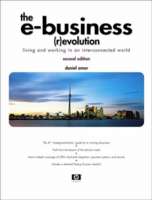Foreword
In the years to come, readers of Daniel Amor's book will look back with mixed feelings at the time when it was first published. That was the period, many will then surely remember, when the world of Internet went through its first phase of consolidation and cleansing. Few even dared to speak of an imminent "Internet led recession". It was undoubtedly an opportune moment for this book to appear. After hundreds of enthusiastic and somehow naive hymns followed by fictional Cassandra's prophecies of an early Doomsday for the Web, Daniel Amor took us all back to what we really required to make sense of our destiny on the longer term. A diligent tableau de bord intentionally aimed at entrepreneurs and managers badly in need of a working tool to take their companies sailing in unchartered waters towards the promised land of the new economy; but even more interestingly, in my view, a practical guide for anybody just willing to understand the profound implications of the (r)evolution on the Internet.
Many will read this book thinking that its added value would be the privilege of getting at first hand an insider's look provided by a celebrated consultant of many large and small companies engaged in e-commerce and intranet projects. Flicking back and forth through the pages of this thick book, I formed a different opinion about Amor's work, for three different reasons.
Firstly, it is of some significance that today's most comprehensive "manual" to e-business should be the work of a European. It's in some way a telling sign of the present time, as Europe is in sight of definitely closing the gap with America and even of gaining important competitive advantages in certain areas where the convergence of enabling Internet technologies and mobile communication systems is more likely to happen. We have been used to the idea that meaningful texts on the e-economy would be mainly "imported" from the United States and only occasionally adapted to European standards and common practises. With Daniel Amor's book, the intellectual and scientific process is now for the first time visibly reversed.
Secondly, this book is not about the techniques but about the usages of Internet technologies and applications. It's the business idea that you should be looking for, not so much the technological vision. Otherwise, even a perfect IT infrastructure, Amor tells us, would never be sufficient. Nothing is more relevant---is Amor's thinking---than understanding the functional changes that are at hand. More important: what counts in today's world is grasping the profound motives for introducing Internet technologies and services in our lives. These motives are seldom explained clearly. Daniel Amor's book is therefore not for insiders. Neither is it directed to "electronic entrepreneurs". Far from it. I would not recommend it to information systems managers. Rather, it should find its place on the desk of any CEO and CFO, irrespectively of his or her mission and role. Perhaps, it might even be of use to heads of human resources as they are getting more and more occupied with continuous organizational changes and creative compensation policies in order to attract talents from the outside and nurture strategic skills internally.
Thirdly, I believe that the most impressive result of Amor's work is a first time "how to" book which contains a long term vision of the strategic options we will have to face eventually. Manuals of this kind, as much as they are based on solid direct operational experience, usually remain a "cold" working instrument. Rational and well structured at best, they are never compelling and intriguing as you consult the various chapters. Not in this case. For example, take Amor's view of the different degree of convergence between media and you will develop a new line of thinking about consumer product innovation. Furthermore, take Amor's view of the potential implications of the tremendous pervasiveness of Internet technologies and applications and you will probably start to evaluate alternatives in deciding which operational and navigational system you want to adopt. He advocates a world order based on open systems, open sources, open services. To read his warnings that the pressure exercised by large corporations keen on imposing universal technological and software standards might entail a deadly loss of creativity and ingenuity across the board is, I think, surprising given his close working relations with some of the same companies he implicitly refers to. It's an act of true intellectual honesty and professional rigor for which any independent business consultant should take credit.
One last thought. Try what I did when I got my copy of this book. Put it on your bookshelf among the many others dedicated to the narration of this fantastic first phase of the e-business revolution. It will show the real gap between the development of the e-technologies and their actual use. Not in theory nor under macroeconomic scenarios, but in real day to day practices. As this gap opens up and is reduced every moment, depending on our company's dynamics, Amor's book should be consulted to measure the changing distance between dreams and reality. The introduction of Internet applications is a long chain of motives and reasons which moves and adapts itself to the needs of individual companies and entrepreneurs. Day after day. Day after day. Endlessly. And when you have finished reading Chapter 8 it's probably time to go back to Chapter 1. An evolution rather than a revolution. This is what it's all about.
Paolo Glisenti
Freelance E-Business and Internet Author
Roma, Italy, December 10th, 2000
